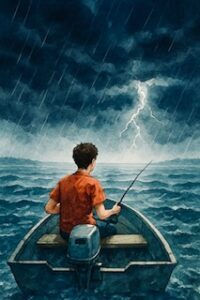R.C. Highcroft's Blog
September 7, 2025
A Gathering Storm (September 7)

“If the weather cleared, the barometer would rise. In that case, the fishing would pick up …”
“But half an hour without strikes confirmed what the gradually darkening skies suggested. The air pressure was dropping. Soon, the rain would return. And worse, there would be few if any fish. Already, no other anglers were in sight. The first droplets dimpled the water here and there. Then their pace quickened…”
At length, “something felt wrong. The air became totally still. A faint flash lit the horizon. A peal of thunder rolled in seconds later. Then a second bolt blazed directly overhead, and a much louder thunderclap followed right away. There was no time to lose. I stowed my gear and turned back towards the Point.
“The worst of the menace abated as quickly as it had arisen. Still, the breeze cooled and the rain fell more heavily than ever. At full throttle, I made it to the dock in twenty minutes.
pp. 166-7
No doubt youngsters are too frequently willing to run risks they should avoid. So older folks feel justified in smiling at how ‘invincible’ their naïve offspring assume they are! But so many diverse hazards beset us that there can be merit in learning to distinguish between cases where a simple yes/no response is best, and others where the key skill is to be able to decide on the degree of danger that one is ready to accept.
I suspect all of us can recall gambles we took that might now be judged unwise, but that made sense at the time. Learning to respect but also to challenge the threats posed by stormy weather probably falls into that category.
Can you post an example of such a choice from your own experience
(Illustration generated by AI)
August 31, 2025
Christies’ Bluff (August 31)

“Christie’s Bluff was a towering island almost ten miles out from our side of the Bay. Its peak was a beacon for anyone who ventured onto the open water. It watched over us all year long… In return we never disregarded it. All whose plans required fair weather commenced their day with a nod to the Bluff. And if a storm threatened to blow in before a family’s men were back home, wives or sisters would glance in that direction from time to time…
“As expected, my parents would hear nothing of it. They had little sense of how dangerous the weather over that body of water could become. But as soon as Granny was able, she took pains to spare me that failing.
“‘One day you’ll be old enough to go wherever you wish on the Bay. You might even find yourself all the way over to the Bluff. Until then, you’ve got plenty to learn.’”
There’s a tendency to populate empty stretches of any wild landscape with imaginary spirits believed to attend to the well-being of ordinary mortals. And when, as in the case of Christie’s Bluff, its warnings are so often accurate, the myth can become more and more persuasive. So each in their own way, the Bluff, the Prospect, the Wash, and the blackbird- and blueberry-blessed promontory behind Grand-père Leduc’s farmhouse could enjoy almost magical status. They were more than mere places. They were guardian presences.
And such features are not restricted to the Georgian Bay region. Every district has its share. Maybe you could post a note about your favourite example in the Reply box below.
Pp. 65-6
(Illustration generated by A)
August 27, 2025
Word on the Street: Sept. 27-8, 2025
 I’m thrilled to be part of Toronto’s Word on the Street Festival this September 27-8! Come say hello and check out Providence Point at the Tellwell Publishing booth in David Pecaut Square. Let’s celebrate Canadian storytelling together!
I’m thrilled to be part of Toronto’s Word on the Street Festival this September 27-8! Come say hello and check out Providence Point at the Tellwell Publishing booth in David Pecaut Square. Let’s celebrate Canadian storytelling together!
August 24, 2025
Dancing on the Rocks (August 24)

Reminiscing about earlier years on the Bay, Mrs. Birmingham tells Rob how his grandparents spent their evenings with his Auntie Lou and Uncle Harry.
“What a crew those four made! Harry and Lou built their cottage just across from the Point… It had a nice lookout over the water, but the whole place was crammed with trees. Nowhere else had as many mosquitoes as over there. I think that’s how they got to know your grandparents. The point on your side was open enough for a breeze, so it had a lot less bugs….
“Your granny and grandpa loved to get outside after dark. He used to wind up a gramophone on the front steps. That was the hint for the others to row across. Then all of them Charlestoned the night away on the flat rocks near the water.”
Indeed, Bix Beiderbecke’s “syncopated melodies” were a musical backdrop to life at the Point. As Rob comments much later, “I catch myself humming them to this day.” And in fact even for those – like many of us! – fated to struggle with two left feet, a compelling tune can capture the essence of a remembered scene far more vividly than the best of photos or verbal anecdotes. A saying attributed to Tolstoy gets it right: “Music is the shorthand of emotion.”
Has that been your experience, too? And for that matter, do any musical pieces come to your mind in relation to particular episodes in Providence Point? By all means leave a comment.
Pp. 212, 28
Illustration Generated by AI
August 16, 2025
Traditional Ways (August 16)

Robbie and Uncle Harry were fishing a few hundred yards off the shoreline of Évariste Leduc’s farmstead. As they watched the patriarch’s elderly spouse working in the sizeable garden, Harry broke the silence: “Here’s a thought, Robbie. What if, in fact, we were living our lives almost the same as the folks in that house?…
“Take your grandmother and Évariste’s wife. Granny’s not as old as her, of course …but they might be more similar than you think…
“I’d say your granny spends her time on things that aren’t so different from that old girl in her vegetable plot.”
After a little verbal fencing, they concluded that while Granny was especially expert in church embroidery, the other was equally skilled in cultivating crops destined for the kitchen table, with Granny’s perfectly stitched “output … as plenteous as the produce from Grand-mère Leduc’s Garden.” In the end Robbie suggested, “So, they both make things. Is that it?” And Harry responded, “Yes, and people respect them for it.”
Anyone with the capacity to make things deserves respect, no matter what they turn out. Not just Granny or Grand-mère Leduc, but also Bébert with his lifelike decoys, Dudley Cadieux with his pie-shaped boat, or any number of other figures who inhabit the pages of Providence Point… or who range freely in the world at large.
Even Geoffrey Chaucer–the first poet in modern English–was proud to call himself a ‘maker’: a creator of stories worth remembering and passing on. From architecture… to aeronautics… to literature, various forms of ‘making’ have carved out an honorable tradition. Most likely you have your own ideal of an exemplary product created by an admirable maker. What is it, and why does it deserve appreciation? Let others know in the Comment section below.
Providence Point, pp 59-61
(Illustration generated by AI)
August 10, 2025
Harvest Festival (August 10)

“As traditional as it might be, Thanksgiving was not the autumn highlight. For Granny and Grandpa, it paled in comparison with Harvest Festival, a kind of lower-key English Thanksgiving three weeks before its Canadian counterpart…. [but] it did have a drawback. Its September date frequently coincided with early frosts that shockingly nipped less hardy vegetables and bowed the heads of flowers still in bloom … All we could do was ignore the forecast.
Granny would roast a shoulder of lamb, and even Grandpa undertook his major culinary exploit of the year. He began by spending a cherished hour dicing candied peal and glazed marrow for a suet pudding. Granny told me she had learned to order a quarter pound extra of each. That was the amount he habitually ate from the bowl … But come what might, each year his masterpiece had pride of place as the climax of our Harvest Festival meal.”
Festive occasions punctuate the calendar in a way that gives meaning to dates and seasons which otherwise risk colourless uniformity. This holds especially true of celebrations observed only by particular families or groups. Growing up in a world marked by such occasions equips children to understand their unique identity as against the surrounding vortex of fads and fashions. Can you think of such touchstone events in your own experience, or that perhaps you have noticed among others? If so, possibly you could share an example in the comment section.
Providence Point, pp. 27-8
(Illustration generated by AI)
August 2, 2025
The Snowy Owl (August 2)
 One spring day Robbie and his grandmother returned to the cottage from a ramble along the edge of the Wash…
One spring day Robbie and his grandmother returned to the cottage from a ramble along the edge of the Wash…
“We slipped quietly into the living room. The hearth gave off precisely the right warmth for an early May afternoon. A roll-your-own smouldered between my grandfather’s dozy fingers. On his lap I saw a spreadeagled Bruce Graeme novel. Granny reached out and rescued the cigarette. He opened his eyes as if he had never nodded off.
“‘You’re back. Was there anything?’
“‘Tell him, Robbie. You saw it first.’
“‘An owl in a tree by the water. I think it was sleeping.’
“‘A snowy owl. Like that time in the old days. Remember? I wish you’d been with us out there, dear.’
“‘Well, we’ll make a note. Good for you, Robbie.’
“He stood up to open an elderly loose-leaf ledger. As long as I could recall, it had occupied a prominent place on the fireplace mantel. … In it he recorded the date of all manner of notable events: a summer hailstorm, a wounded gull in the lee of the cottage, or an unusually early frost. And each spring he documented the re-appearance of leaves, plants, flowers, and migrating birds. The owl was duly registered.”
Providence Point, pp. 90-91
In this age of computers and digital communication, it might seem that record-keeping should be simpler and more efficient than ever, but apparently not. The days of the personal diary are long past, along with the era of respect for carefully preserved memories. So much of what we experience is forgotten for lack of ever being written down.
All the same, there may be exceptions. Does anyone you know still adhere to the practice of keeping a journal? The comment section might be a good place to offer them well-deserved recognition.
(Illustration generated by AI)
July 26, 2025
Catching Snakes (July 26)
 “My grandmother assigned herself the task of setting me on the path towards accomplishments she felt were indispensable for any full-grown man… A case in point was handling snakes deftly and with confidence.” For example, after a little encouragement, “I edged forward and swept my legs through the grass. A telltale ripple slid away, then stopped. My pulse quickened… Somehow my fingers made contact in the right place. When I stood back up, the quarry was my own.”
“My grandmother assigned herself the task of setting me on the path towards accomplishments she felt were indispensable for any full-grown man… A case in point was handling snakes deftly and with confidence.” For example, after a little encouragement, “I edged forward and swept my legs through the grass. A telltale ripple slid away, then stopped. My pulse quickened… Somehow my fingers made contact in the right place. When I stood back up, the quarry was my own.”
Providence Point, pp. 53-4
It little mattered that grass snakes posed no real danger, or that Granny gave signs of being as nervous about catching them as her grandson was. Nor that Robbie’s mother quickly intervened to disapprove heartily of both their efforts. When she insisted that her son promise that he’d “never do that again,” his consent was tempered by the rider that “Surely, her ‘never’ must have been intended to include ‘when I’m there to see you.’”
(p. 55)
As is often attributed to Mark Twain, “Truth is the most valuable thing we have. Let us economize it.” And so Robbie learned to chart a course between the plentiful shoals that threatened him on every side. Understanding the limits to the wisdom of one’s elders – and determining which would-be mentors most deserve respect – is a difficult lesson every child must eventually master.
Does such an epiphany from your own childhood come to mind? If so, feel free to leave a comment. And if you’d like a chance to follow Robbie’s maturation more closely, you’ll find links to online booksellers of Providence Point below.
(Illustration generated by AI)
July 19, 2025
The Pie-Shaped Boat (July 19)
 In common with many local men, Dudley Cadieux constructed his own boat, though his “rudimentary woodworking skills forced him to eliminate nearly all curvature from the design. The resulting contours had very much the profile of a slice of pie.”
In common with many local men, Dudley Cadieux constructed his own boat, though his “rudimentary woodworking skills forced him to eliminate nearly all curvature from the design. The resulting contours had very much the profile of a slice of pie.”
Moreover, the skiff’s colour scheme added to that effect. “Its exterior was painted a warm tone of beige. The inside was buttercup yellow.” Of course, “Dudley … was ready with … an iron-clad explanation. ‘It’s excellent enamel. The store had two custom tins that somebody didn’t collect. … The price was right. So, why not?’”
And in the end, “Granny offered the description that stuck. ‘It looks like a piece of Mrs. Birmingham’s lemon pie.’ From then on it was the pie-shaped boat.”
Providence Point, p. 133
That homemade boat exemplified an entrepreneurial spirit that was typical along the shoreline of the Bay. Dudley no doubt lacked the master touch of an artisan like Bébert. Still, his self-reliance eventually proved to be justified. His chef-d’oeuvre’s ill-fitting seams may have taken unusually long to tighten after being set afloat, but finally he possessed as seaworthy as craft as any other.
Even in those days, willingness to tackle projects demanding skills beyond one’s formal training was becoming rare in the city. For instance, the immediate post-War flurry of self-constructed homes had largely died out. And drivers capable of maintaining their own vehicles were growing scarce. As the current terminology would have it, city dwellers were becoming ‘de-skilled.’ Such self-reliance was more and more restricted to countryside settings.
Not every reader will have grown up in the company of people who displayed that kind of independence. But if you had that good fortune, please leave a comment.
(Illustration generated by AI)
July 12, 2025
Bébert’s Handiwork (July 12)

On the family’s return from a day-long outing designed to allow Bébert to complete an odd job without interference, ‘Granny’s voice [could be heard] … from the front of the building. “Robbie. Come see what Bébert left for us.”
‘On the stone base of the flagpole sat a duck decoy. It was unpainted but perfectly proportioned. He had pieced it together from off-cuts. The life-size body was roughed in just enough for a convincing profile, yet the head and arching neck were carved in remarkable detail.
‘… Granny carried it to the water’s edge to set it afloat. It was flawlessly balanced. She watched it bobbing at her feet. “Look, dear. It’s astonishing.” My grandfather stepped over beside her.
‘“Yes, it is.” He paused for a sigh. “That Bébert knows how to be a happy man.”’
Providence Point, p. 108
Working alone to replace the rickety wooden steps beneath the kitchen doorway at the Point, Bébert had displayed his habitually excellent craftsmanship. Still, he had a cross to bear: the plague of insurmountable alcoholism. Whenever that sporadic affliction reached out for him, he was incapable of resisting. But in between times he shone as a master carpenter and an unsurpassed woodsman. He dearly loved his family even though Janine and the children had to make do with a father whose presence could never be predicted.
The world of Providence Point features shadows as well as sunlight. Attachment to such a milieu requires willingness to accommodate both. Perhaps you’ve discovered a passage that particularly struck you for its joyfulness or its melancholy. If so, why not leave a comment?
(Illustration generated by AI)



